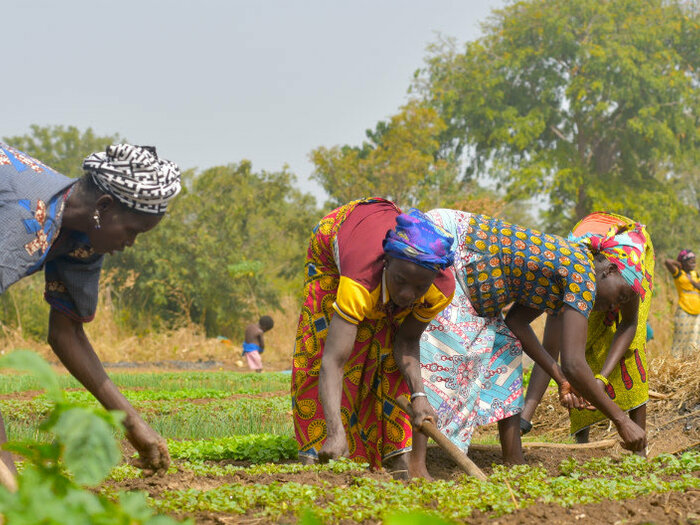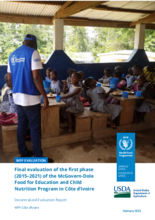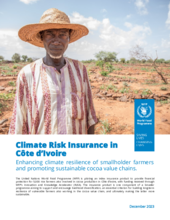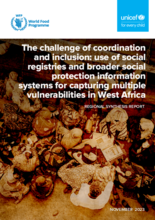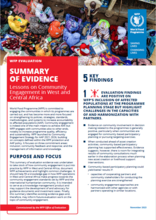Côte d'Ivoire
- 46%
- of people live below the poverty line of US$1.22 per day
- 30%
- stunting prevalence in north and central-west
- 29.4 million
- population
Political stability has paved the way for strong economic growth in Côte d'Ivoire over the past decade, with increased investment in basic social services and a reduction in poverty.
However, food insecurity, malnutrition and gender inequalities remain widespread, with 46 percent of people living below the poverty line and nearly 23 percent of children stunted (impaired growth due to malnutrition) nationwide.
Despite these challenges, the Government’s five-year National Development Plan aims to transform the country into a middle-income economy by 2025. It is designed to accelerate the development of people’s health, skills, experience and knowledge – known as a country’s human capital – and social well-being.
The World Food Programme is placing an increased focus on capacity building, to ensure that programmes can be owned by the Government and communities. Our activities encompass life-saving operations, resilience-building activities and institutional system strengthening. At the core of this approach is the sustainability of the national school meals programme, through food-systems strengthening and women’s empowerment.
What the World Food Programme is doing in Côte d'Ivoire
-
School feeding programme
-
WFP provides school meals to 125,000 targeted children throughout the school year, and 15,000 girls and boys are supported through take-home rations to encourage completion of the primary education cycle. Targeted school-age children also benefit from complementary services such as school gardens, deworming, social behaviour change communication-related activities, and improved learning tools and materials. Simultaneously, WFP works to strengthen the capacities of smallholder farmers’ groups established near schools to increase the community contribution to the school feeding programme.
-
Nutrition
-
WFP programmes are systematically designed to be nutrition-sensitive to address the nutrition needs of the most vulnerable groups. WFP supports school canteens with nutritious and diverse foods, deworming treatment, as well as training on good hygiene and nutrition practices. By linking smallholder farmers to schools, WFP promotes the production of diverse and nutrient-rich foods that are made available to the school feeding programme as well as available on local markets. WFP supports the implementation of the national nutrition programme, with a focus on the development and implementation of a gender-responsive social behaviour change communication strategy and the implementation of the national strategy for the fortification of regularly consumed staples.
-
Smallholder Agricultural Market Support
-
WFP initiated the Small Agricultural Market Support pilot project in 2017 to advance the sustainability of the national school feeding programme, targeting women’s smallholder farmer groups established around school canteens. The project supports nearly 3,817 farmers organised in 35 farmer groups, 83% of whom are women. WFP wants to reach 1,250 farmers’ groups (approximately 125,000 farmers) throughout the CSP period. The objective is to enhance their livelihoods, strengthen resilience to shocks through efficient value chains and sustainable food systems, through the sharing and adoption of good agricultural practices and technologies that improve food production and processing, and reduce post-harvest losses.
-
Reintegration and livelihoods support for returnees and population affected by shocks
-
WFP maintains its capacity to respond to emergencies in order to address the immediate food and nutrition needs of affected population. Food and cash-based transfers are provided, through genderresponsive and nutrition-sensitive approaches. Relief food assistance is also provided to returnees who fled the country following the postelection crisis of 2010/2011, through three-months food kits upon return and integration in productive asset creation activities (such as poultry farms, fish ponds, lowland development and rehabilitation). WFP is helping vulnerable returnees and host populations to meet their immediate food needs, while supporting the restoration of their livelihoods, strengthening their resilience and promoting social cohesion in conflict-affected fragile communities.
-
Technical Cooperation with Cote d’Ivoire
-
A Regional Center of Excellence against hunger and malnutrition was established in Côte d'Ivoire in 2019 in partnership with the Government, to respond to a growing demand from regional governments to strengthen their national capacities in food and nutrition security. The Center contributes to achieving SDG2 and SDG17, facilitating the sharing of knowledge and experiences among countries. The Center thus provides technical support for the design, management and expansion of policy, institutional and legal frameworks, and sustainable programs towards zero hunger through South-South cooperation.
In focus
Côte d'Ivoire news releases
Go to pagePartners and Donors
Find out more about the state of food security in Côte d'Ivoire
Visit the food security analysis pageOperations in Côte d'Ivoire
Contacts
Office
CCIA-BAD, 4th floor 01 BP 1747 Abidjan 01, Côte d’Ivoire
Abidjan Plateau
Côte d’Ivoire

